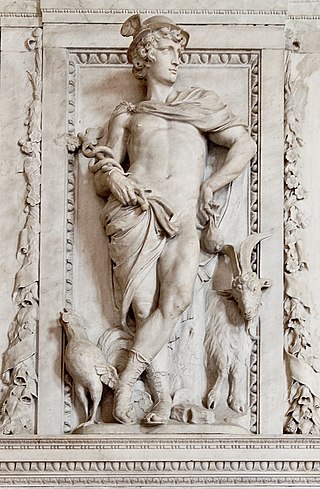
Hades, in the ancient Greek religion and mythology, is the god of the dead and the king of the underworld, with which his name became synonymous. Hades was the eldest son of Cronus and Rhea, although this also made him the last son to be regurgitated by his father. He and his brothers, Zeus and Poseidon, defeated their father's generation of gods, the Titans, and claimed joint rulership over the cosmos. Hades received the underworld, Zeus the sky, and Poseidon the sea, with the solid earth available to all three concurrently. In artistic depictions, Hades is typically portrayed holding a bident and wearing his helm with Cerberus, the three-headed guard-dog of the underworld, standing at his side.

Lupercalia, also known as Lupercal, was a pastoral festival of Ancient Rome observed annually on February 15 to purify the city, promoting health and fertility. Lupercalia was also known as dies Februatus, after the purification instruments called februa, the basis for the month named Februarius.

Mercury is a major god in Roman religion and mythology, being one of the 12 Dii Consentes within the ancient Roman pantheon. He is the god of financial gain, commerce, eloquence, messages, communication, travelers, boundaries, luck, trickery, and thieves; he also serves as the guide of souls to the underworld and the "messenger of the gods".

In ancient Roman religion and myth, Faunus was the rustic god of the forest, plains and fields; when he made cattle fertile, he was called Inuus. He came to be equated in literature with the Greek god Pan, after which Romans depicted him as a horned god.

In Greek mythology, the Cabeiri or Cabiri, also transliterated Kabeiri or Kabiri, were a group of enigmatic chthonic deities. They were worshipped in a mystery cult closely associated with that of Hephaestus, centered in the north Aegean islands of Lemnos and possibly Samothrace—at the Samothrace temple complex—and at Thebes. In their distant origins the Cabeiri and the Samothracian gods may include pre-Greek elements, or other non-Greek elements, such as Thracian, Tyrrhenian, Pelasgian, Phrygian or Hittite. The Lemnian cult was always local to Lemnos, but the Samothracian mystery cult spread rapidly throughout the Greek world during the Hellenistic period, eventually initiating Romans.

Orcus was a god of the underworld, punisher of broken oaths in Etruscan and Roman mythology. As with Hades, the name of the god was also used for the underworld itself. Eventually, he was conflated with Dis Pater and Pluto.

Febris, or Dea Febris, is the Roman goddess of fevers, who embodied, but also protected people from fever and malaria. Because of this, Febris was a feared goddess whom people wanted the favour of. She does not have a myth of her own nor is she mentioned in a myth. Among her characteristic attributes are "shrewdness" and "honesty", according to Seneca the Younger's Apocolocyntosis.
Libitina, also Libentina or Lubentina, is an ancient Roman goddess of funerals and burial. Her name was used as a metonymy for death, and undertakers were known as libitinarii. Libitina was associated with Venus, and the name appears in some authors as an epithet of Venus.

Etruscan religion comprises a set of stories, beliefs, and religious practices of the Etruscan civilization, heavily influenced by the mythology of ancient Greece, and sharing similarities with concurrent Roman mythology and religion. As the Etruscan civilization was gradually assimilated into the Roman Republic from the 4th century BC, the Etruscan religion and mythology were partially incorporated into ancient Roman culture, following the Roman tendency to absorb some of the local gods and customs of conquered lands. The first attestations of an Etruscan religion can be traced back to the Villanovan culture.

Neptune is the god of freshwater and the sea in the Roman religion. He is the counterpart of the Greek god Poseidon. In the Greek-inspired tradition, he is a brother of Jupiter and Pluto, with whom preside over the realms of heaven, the earthly world, and the seas. Salacia is his wife.

In ancient Roman religion and myth, Janus is the god of beginnings, gates, transitions, time, duality, doorways, passages, frames, and endings. He is usually depicted as having two faces. The month of January is named for Janus (Ianuarius). According to ancient Roman farmers' almanacs, Juno was mistaken as the tutelary deity of the month of January, but Juno is the tutelary deity of the month of June.

Religious practices in ancient Greece encompassed a collection of beliefs, rituals, and mythology, in the form of both popular public religion and cult practices. The application of the modern concept of "religion" to ancient cultures has been questioned as anachronistic. The ancient Greeks did not have a word for 'religion' in the modern sense. Likewise, no Greek writer known to us classifies either the gods or the cult practices into separate 'religions'. Instead, for example, Herodotus speaks of the Hellenes as having "common shrines of the gods and sacrifices, and the same kinds of customs."
Festivals in ancient Rome were a very important part in Roman religious life during both the Republican and Imperial eras, and one of the primary features of the Roman calendar. Feriae were either public (publicae) or private (privatae). State holidays were celebrated by the Roman people and received public funding. Games (ludi), such as the Ludi Apollinares, were not technically feriae, but the days on which they were celebrated were dies festi, holidays in the modern sense of days off work. Although feriae were paid for by the state, ludi were often funded by wealthy individuals. Feriae privatae were holidays celebrated in honor of private individuals or by families. This article deals only with public holidays, including rites celebrated by the state priests of Rome at temples, as well as celebrations by neighborhoods, families, and friends held simultaneously throughout Rome.

The word chthonic, or chthonian, is derived from the Ancient Greek word χθών, "khthon", meaning earth or soil. It translates more directly from χθόνιος or "in, under, or beneath the earth" which can be differentiated from Γῆ, or "ge", which speaks to the living surface of land on the earth. In Greek, chthonic is a descriptive word for things relating to the underworld and can be used in the context of chthonic gods, chthonic rituals, chthonic cults, and more. This is as compared to the more commonly referred-to Olympic gods and their associated rites and cults. Olympic gods are understood to reference that which exists above the earth, particularly in the sky. Gods that are related to agriculture are also considered to have chthonic associations as planting and growing take place in part under the earth.

Juno was an ancient Roman goddess, the protector and special counsellor of the state. She was equated to Hera, queen of the gods in Greek mythology and a goddess of love and marriage. A daughter of Saturn and Ops, she was the sister and wife of Jupiter and the mother of Mars, Vulcan, Bellona, Lucina and Juventas. Like Hera, her sacred animal was the peacock. Her Etruscan counterpart was Uni, and she was said to also watch over the women of Rome. As the patron goddess of Rome and the Roman Empire, Juno was called Regina ("Queen") and was a member of the Capitoline Triad, centered on the Capitoline Hill in Rome, and also including Jupiter, and Minerva, goddess of wisdom.
Nature worship also called naturism or physiolatry is any of a variety of religious, spiritual and devotional practices that focus on the worship of the nature spirits considered to be behind the natural phenomena visible throughout nature. A nature deity can be in charge of nature, a place, a biotope, the biosphere, the cosmos, or the universe. Nature worship is often considered the primitive source of modern religious beliefs and can be found in pantheism, panentheism, deism, polytheism, animism, Taoism, totemism, Hinduism, shamanism, some theism and paganism including Wicca. Common to most forms of nature worship is a spiritual focus on the individual's connection and influence on some aspects of the natural world and reverence towards it. Due to their admiration of nature, the works of Edmund Spenser, Anthony Ashley-Cooper and Carl Linnaeus were viewed as nature worship.
The di inferi or dii inferi were a shadowy collective of ancient Roman deities associated with death and the underworld. The epithet inferi is also given to the mysterious Manes, a collective of ancestral spirits. The most likely origin of the word Manes is from manus or manis, meaning "good" or "kindly," which was a euphemistic way to speak of the inferi so as to avert their potential to harm or cause fear.

The mysteries of Isis were religious initiation rites performed in the cult of the Egyptian goddess Isis in the Greco-Roman world. They were modeled on other mystery rites, particularly the Eleusinian mysteries in honor of the Greek goddesses Demeter and Persephone, and originated sometime between the third century BCE and the second century CE. Despite their mainly Hellenistic origins, the mysteries alluded to beliefs from ancient Egyptian religion, in which the worship of Isis arose, and may have incorporated aspects of Egyptian ritual. Although Isis was worshipped across the Greco-Roman world, the mystery rites are only known to have been practiced in a few regions. In areas where they were practiced, they served to strengthen devotees' commitment to the Isis cult, although they were not required to worship her exclusively, and devotees may have risen in the cult's hierarchy by undergoing initiation. The rites may also have been thought to guarantee that the initiate's soul, with the goddess's help, would continue after death into a blissful afterlife.
















